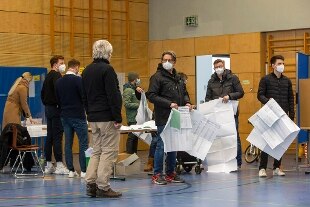Germany, exit poll: CDU collapse in Baden-Württemberg and Rhineland-Palatinate
Germany: voting in Baden-Württemberg and Rhineland-Palatinate.
Exit poll: CDU collapse
Share
March 14, 2021 "Today is a good day, also because it shows that in Germany it is possible to form a government without the CDU".
The sentence is by Olaf Scholz, candidate for chancellor of the SPD and German finance minister, but perfectly captures the atmosphere that reigns in Berlin with still hot ballot boxes after the double vote in Baden Wuerttemberg and Rhineland Palatinate: Angela Merkel's party has suffered a bitter defeat, that is, he scored the worst result in the history of their respective Laender, and this just six months before the federal elections on 26 September.
And both in Stuttgart and in Mainz coalitions can emerge that exclude the Christian Democrats, that is, made up exclusively of Greens, SPDs and liberals.
According to the latest projections (7 pm), in Baden Wuerttemberg the environmental party (already in government here with Winfried Kretschmann) achieves a result of around 32%, thereby achieving the best result of the Greens both at a regional and national level.
On the other hand, the CDU, brought to the polls by candidate Susanne Eisenmann, stops at a result of around 23.5% (in 2016 it was 27%), which is particularly painful for a Land that was once one of its solid strongholds. .
The SPD slightly exceeds 11%, a breath above the liberals of the FDP at 10.7, while the AFD with 10.5% still appears to bear the brunt of having been put under investigation at the level by the internal secret services of the Federal Office for the Defense of the Constitution (BfV).
It is no better for the party that once belonged to Adenauer and Kohl in Rhineland Palatinate, where the voters wanted to decisively reward the government experience of the social democratic Malu Dreyer, thereby giving a "sign of life" (as Spiegel writes) for the SPD also at national level: here the heirs of Brandt and Schmidt manage to obtain, according to the latest ARD projections, 35.7% of the consensus against 26.8% of the CDU: here too, for training which was driven for 18 years by Frau Merkel, a "historic" thud with a net bleeding compared to 31.8% five years ago.
In the Rhineland the result of the Greens is much more contained, with 8% of the consensus which in any case represents a significant leap compared to the 2016 elections. While the Liberals get 5.9%, the Free voters (Freie Waehler), with 6% of the vote.
Linke, the party of the left, remains out of both Landtag with 3.2% and 2.3% respectively.
From the beginning, this double electoral appointment was considered a test case in view of the federal elections on September 26: a vote that promises to be historic, given that it is the first without Angela Merkel to run as chancellor after 16 years in government. and that arrives in the Covid era, with the blows and repercussions that this brings with it.
And for the CDU the prospects certainly do not seem rosy: with a new leader, Armin Laschet, who collects a heavy double defeat and is forced to face the consequences of the scandal of the masks on which their parliamentarians would have profited, while still, less than six months after the vote, there is no name for the rush to the chancellery.
Not surprisingly, the general secretary of the CDU, Paul Ziemiak, tried to get his hands on: in front of the cameras he hastens to declare that the result in Baden Wuerttemberg and Rhineland Palatinate "will have no impact on the decision regarding the candidacy for the chancellery. ", the original program remains, that is" that CDU and CSU will make their decision between Easter and Pentecost ".
Few believe him, starting with the Greens, that in national polls they travel around 20% of the votes, thereby confirming steadily as the second political force in the country.
"For us it is a super start in a super election year" enthused the leaders of the environmentalist party, Robert Habeck and Annalena Baerbock, who see the possibility of being decisive in the formation of a future national government getting even closer.
Meanwhile, eyes are focused on the next electoral appointments: the one for the renewal of the Landtag in Saxony-Anhalt is set for the beginning of June, to follow the election day of September 26, when the polls for the national elections and those in the Laender will open at the same time. of Berlin, Mecklenburg and Thuringia.
Obviously, the great maneuvers for the formation of the two Laender governments are already in full swing, and currently none of the political seismographs seems to be in favor of the CDU.
Although in Baden Wuerttemberg the Christian Democrats have made it known that they are willing to continue the alliance with Kretschmann's Greens, Kretschmann has taken great care to show obvious openings, limiting himself to saying that they will start talks "with all political forces. ".
In practice, in both Laender the prices are rising for an alliance between the Greens, the SPD and the liberals, the so-called "traffic light coalition", with the color of the three parties.
For the CDU, the prospects appear bad in view of the appointment with the national polls of the 26 national team: squeezed between what appears to be "the beginning of the end" of the Merkel bonus, the painful slowness in the anti-Covid vaccination campaign, the embarrassing mask trafficking scandal involving its own exponents, the proud German Christian Democrats still do not have a convincing candidate for the chancellery.
And time is running out.

